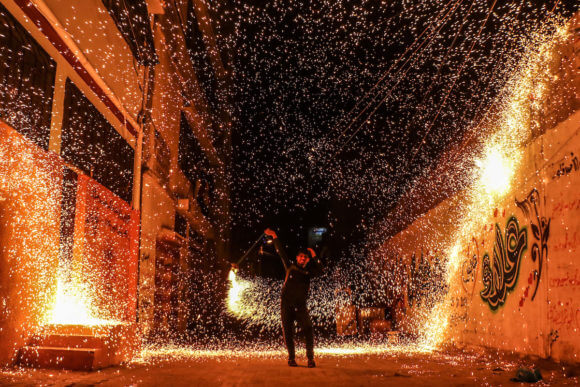This is the latest edition of our special coverage newsletter on the COVID-19 crisis in Palestine featuring dispatches directly from our Palestine correspondent Yumna Patel on the ground in Bethlehem. This newsletter is published Tuesdays and Fridays.
Next week will mark two months since we were put on coronavirus lockdown in Bethlehem, and a state of emergency was declared in Palestine.
Like much of the rest of the world, our lives were changed drastically in the matter of 24 hours. Our days have been characterized by heavy restrictions on movement, empty churches and mosques, and social distancing orders.
But in the past few days, everything has started to return back to normal: streets are filled with traffic again, police checkpoints are gone, businesses are opening periodically, and people are crowding the shops and streets throughout the day.
The government has begun its plans of slowly reopening certain non-essential sectors of the economy, reassuring us that they have enough control over the situation so that this won’t jeopardize public health.
While I thought I would be overjoyed to see this return to (relative) normalcy, I have never been more worried about the coronavirus situation in Bethlehem than I am now.
When I went to the grocery store over the weekend, the clothing stores nearby were packed to the brim, with very few people wearing gloves and masks.
In the neighborhood where I live, Ramadan has shockingly turned out to be, for the most part, just like any other year. Yes, the mosque remains closed, but children are playing in the street together, friends are hanging out and playing cards, and families and neighbors are inviting one another over for iftar.
At first we thought maybe the ease of restrictions would just be for the day before Ramadan to let people get everything they needed to prepare for the holy month unhindered. But the roads have only gotten more crowded since then, and it doesn’t seem like it’s going to stop any time soon.
Whether people are just taking the government’s word for it, or are simply just tired of being under quarantine, many people seem to be unphased by the pandemic that is still ravaging the world around us.
It was just last week when two new cases of the virus were announced in the Dheisheh refugee camp, which is home to some 15,000 people and is located in the middle of the city. Friends from Dheisheh tell me that the quarantine around the camp hasn’t been enforced in days.
With the amount of movement and interaction going on in the city, it seems like a ticking time bomb in Bethlehem, and inevitably the rest of the West Bank.
Since the outbreak began, 27,800 tests have been conducted in the West Bank and Gaza — a small number compared to the combined population of over 5 million people, the majority of whom live in rural villages and areas where the government doesn’t have full access to.
Meanwhile in Israel, the government is expected to start conducting 15,000 tests per day, for a population of around 9 million.
Since this pandemic started, people living in the occupied territories have been painfully aware of the fact that we are at an inherent disadvantage when it comes to fighting this virus.
A flailing healthcare system, a government with insufficient financial resources, severe lack of essential medical equipment, and limited access to testing kits would create the perfect storm for the coronavirus to devastate Palestine.
It’s the reason why everyone, the government and the people, took the situation so seriously from the moment the first case was confirmed.
But now that attitude has seemed to change drastically and thought of what that could cause is terrifying.
As people across the globe voice concerns over a “second wave” of the coronavirus, I fear that while we have ridden the first wave with relative ease, the second wave is going to hit us 10 times harder.
Thanks for reading, and stay safe. Don’t forget to join our webinar tomorrow, Wednesday April 29th, discussing Israeli violations in the occupied territory during COVID-19.
-Yumna


